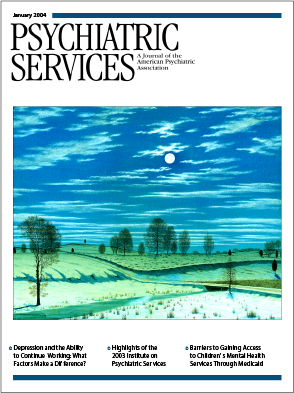Criminal History as a Prognostic Indicator in the Treatment of Homeless People With Severe Mental Illness
Abstract
OBJECTIVE: This study examined the clinical problems and treatment outcomes of homeless people with severe mental illness and a history of incarceration. METHODS: Between May 1994 and June 1998, a total of 5,774 people entered assertive community treatment case management services in the Access to Community Care and Effective Services and Supports (ACCESS) demonstration program at 18 sites in nine states. This study used data from reassessments at 12 months after program entry. Analysis of variance was used to compare baseline status and 12-month outcomes for clients with a lifetime incarceration history of less than six months, of six months or more, and no incarceration history. The outcomes assessed were housing status, employment status, psychiatric problems, alcohol problems, drug problems, and criminal justice involvement. RESULTS: Two-thirds of the ACCESS clients had a history of incarceration, with about one-third having less than six months of incarceration and about one-third having six months or more of incarceration. Clients with a long-term incarceration history had higher psychiatric symptom scores, higher drug use and alcohol use scores, and higher levels of dual diagnosis than those with a short-term incarceration history or those with no history of incarceration. The same order of differences was found on measures of childhood abuse, family-of-origin stability, and childhood conduct disorder. Clients with an incarceration history of six months or more reported higher levels of long-term homelessness than the group without an incarceration history. The group with an incarceration history of less than six months showed less improvement at the 12-month follow-up evaluation than the group with no incarceration history on only one outcome measure, psychiatric problems. The group with an incarceration history of six months or more had poorer outcomes than the group with no incarceration history on only two of six outcomes, psychiatric problems and number of days in jail. CONCLUSIONS: This study found that among homeless clients with severe mental illness, clients with a history of incarceration have more serious problems and show somewhat less improvement in some community adjustment domains.



